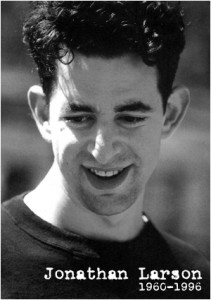Filichia Features: Tick, Tick … Boom! – Jonathan Larson’s Other Musical
Filichia Features: Tick, Tick … Boom! – Jonathan Larson’s Other Musical
 Thirty is usually the first birthday that any of us dreads. Twenty-nine year-old Jonathan Larson did as well in 1990 – especially because he’d been trying to get a foothold on Broadway for years and he seemed to be getting nowhere. “I’m older than my dad was when I was born,” he rued.
Thirty is usually the first birthday that any of us dreads. Twenty-nine year-old Jonathan Larson did as well in 1990 – especially because he’d been trying to get a foothold on Broadway for years and he seemed to be getting nowhere. “I’m older than my dad was when I was born,” he rued.
Of course, anyone in his 40s, 50s and beyond certainly believes that 30 is young. But the sad irony is that Jonathan Larson was already in the sunset of his life; he died on Jan. 25, 1996 of an aortic aneurysm, only a matter of days before his 36th birthday. That he succumbed only a day before the first preview of Rent -- his musical that the world would eventually know -- was more horrible. What a shame that he didn’t live to see it even once in front of an audience.
But six years earlier, a going-nowhere-fast Larson wrote an autobiographical musical called Tick, Tick... Boom! Throughout it, he constantly said “Tick, tick, tick” as a way of reminding him that the second hand of the clock was moving in the only direction it ever goes. Jonathan was now considering making his 30th birthday his final deadline. If he hadn’t “made it” by then, shouldn’t he give up?
Needless to say, Larson would have felt far worse if he’d known that his life was already 5/6th over.
Being ignored by Broadway wasn’t Jonathan’s only problem. His girlfriend Susan, in between asking the inevitable Where-are-we-going questions, was hinting that he should find a new career. As a dancer, she’d been matching his lack of success, but she was ready to do something else with her time – such as spend more of it with Jonathan. Trouble is, he preferred to use those hours for writing.
On other end of the spectrum was Jonathan’s oldest and dearest childhood friend Michael. He was a former struggling actor who’d already thrown in the theatrical towel. Now he was in the corporate world as a market research executive, not to mention rich and happy.
Michael ostensibly planned to help Jonathan by hiring him to come up with ideas at a market research meeting. Jonathan failed miserably – mostly because he was honest in the way he saw the product.
This spurred some questions. Did Michael know in advance that Jonathan would fail? Did he need that to happen to aggrandize himself and feel superior? Sometimes even a best friend acts in that underhanded way.
 Michael knew that his long-held dream of becoming a professional actor was dead. If he could get Jonathan to give up, too, then he’d never have to worry that his pal would succeed. Seeing Jonathan prosper in his chosen profession would have made Michael ask the tough question: could he too have succeeded if he’d only stayed with it? Jonathan was wise enough to know that when you give up, there’s no chance that the next time the phone rings, the call could change your life. Without that possibility, life becomes much less exciting. Make no mistake about: Jonathan liked money a lot and certainly felt it was better than not having it. He simply wanted to make it his way.
Michael knew that his long-held dream of becoming a professional actor was dead. If he could get Jonathan to give up, too, then he’d never have to worry that his pal would succeed. Seeing Jonathan prosper in his chosen profession would have made Michael ask the tough question: could he too have succeeded if he’d only stayed with it? Jonathan was wise enough to know that when you give up, there’s no chance that the next time the phone rings, the call could change your life. Without that possibility, life becomes much less exciting. Make no mistake about: Jonathan liked money a lot and certainly felt it was better than not having it. He simply wanted to make it his way.
Still, “art isn’t easy,” as Stephen Sondheim wrote – and this from a man who’s won seven Tony Awards, an Oscar, a Pulitzer and a Kennedy Center honor. Thus, it had to be less easy for the less accomplished Jonathan. He endured his day-job at a diner that became a morning-and-night job, too -- when he was glad to get the extra shift that gave him money and hated to get the extra shift that killed his soul. What’s more, as many of us have learned, working with the public is the fastest way to lose respect for people. One customer, when his order was incorrectly delivered, snarled at Jonathan, “That’s why you’re just a waiter.”
And what did the workshop of Jonathan’s latest musical yield? “We’re intrigued by your talent” his agent said in a phone call that he’d hoped would include the information “Nine producers are fighting for the rights.” Nope: “intrigued by your talent” was the best Jonathan would get – in 1990.
But when you think of it, doesn’t every musical theater biography involve an early failure? Sondheim couldn’t get Saturday Night produced. Kander and Ebb’s Flora, the Red Menace lasted 87 performances, 1/13th as long as their next show: Cabaret. Cole Porter was so embarrassed by the failure of See America First that he left the country.
Larson wrote Tick, Tick... Boom! for three performers, although Michael and Susan would do a peck of extra roles. Because community and school theaters don’t have the salary restraints of an off-Broadway musical, they might instead cast other performers who’d be willing to play a small role or two.
The other parts for women include Jonathan’s mother, who would welcome him home if that would help; his agent Rosa Stevens, a tough ten-percenter who gives him less time than he’d like; and a couple of corporate executives and restaurant customers, all of whom make Jonathan’s life harder.
And then there’s Karessa, an actress who’ll be in Jonathan’s workshop – and one of whom Susan becomes jealous. Karessa is assigned the song “Come to Your Senses” -- an important one, for it’s the song that most convinces us that Jonathan has genuine talent.
Taking away such a splendid piece of material from the actress playing Susan may sting, but the lady has plenty else to do in the show.
The small roles for males admittedly aren’t as juicy. In addition to the corporate executives and restaurant customers, there’s a grocery clerk. However, although Jonathan’s father doesn’t have much to say, he is encouraging. Tick, Tick... Boom! reiterates that parents who support their kids – emotionally if even not financially – are giving them the greatest gift. Making children believe that they can succeed allows the children to believe that they can succeed, too.
David Christopher’s recent production at the Edison (New Jersey) Valley Playhouse kept to the three-person formula and was a terrific success. Granted, as superb as Tony Mowatt was as Jonathan, he was miscast in one distinct way: Jonathan complains that “hairs on my head are getting thinner,” but Mowatt -- undoubtedly to his relief -- has a marvelously healthy head of hair. (An aside: I knew Jonathan Larson, and I didn’t ever think he was remotely losing his hair.)
Mowatt can also play the piano, which helped make him seem more like a composer-lyricist. Nevertheless, this isn’t a requirement of the role. A musical director can fill in while your Jonathan mimes tickling the ivories. Still, if you have a Jonathan who can play the piano, so much the better.
What you don’t need is an actor with leading man looks. He doesn’t even require all that great a voice; after all, composers and/or lyricists are famous for their weak voices. (Ever hear Cole Porter?)
During “Johnny Can’t Decide” – in which he sings about his dilemma -- Christopher had both Michael (a potent Jonathan G Galvez) and Susan (an able-bodied Krissy Daniels) encircle Jonathan in continuous motion. In other words, there’s a way to have a turntable effect without having a turntable.
Galvez kept us guessing whether he was sincere in wanting to help Jonathan before his final scene in which we saw he was. Daniels well expressed the dilemma a lover has in consorting with an artist who isn’t successful – and may never be.
But it’s Jonathan’s show, a tour-de-force for an actor who never leaves the stage. By the end of the 90-minute intermissionless piece, Mowatt had worked so hard that we had to wonder if he had enough breath left to blow out 30 birthday candles.
It’s an easy show to produce. You’ll need a mighty expensive-looking suit for Michael, but actors’ street clothes suffice for the other two characters. There’s no real set required. Here in Edison, Dawn Noonan provided a backdrop of downtown New York City that included the World Trade Center; the show does, after all, take place in 1990. But there’s another cruel irony at work here: Tick, Tick... Boom! originally opened on June 13, 2001, fewer than three months before the Twin Towers fell.
Tick, Tick... Boom! will please theatergoers who know Larson’s RENT, for they’ll see that the songwriter had ideas that he later inserted into the future mega-hit. Susan at one point says, “We could get out of here” – meaning New York – and you almost expect her to suggest that they open up a restaurant in Santa Fe. Michael brags that where he now lives there’s “no more throwing down the key because there is no buzzer” – an action we see happen in the first scene of RENT. But Michael will also confess that he has the same disease that will take the life of Angel in RENT, too. Most important of all, Jonathan says he wants to write a song that people will listen to and remember – which is precisely what happened with “Seasons of Love.”
Tick, Tick... Boom! also has the potential to be a good midnight show, especially if you have it immediately follow a performance of Rent or Sunday In The Park With George. And why the latter? For one thing, there’s a song called “Sunday” that is a riff on Sondheim’s “Sunday” in that 1984 masterpiece. More to the point, Sondheim himself provides the climax by making an encouraging phone call.
Best of all, the show reiterates that there is enough time if we properly use it. Jonathan Larson didn’t have as much as he or we would have liked, but he proved that he had ample opportunity to leave us with two fine musicals.
 You may e-mail Peter at pfilichia@aol.com.
You may e-mail Peter at pfilichia@aol.com.
Check out his weekly column each Tuesday at www.masterworksbroadway.com and each Friday at www.kritzerland.com.
His book, Strippers, Showgirls, and Sharks – a Very Opinionated History of the Broadway Musicals That Did Not Win the Tony Award is now available at www.amazon.com.

























